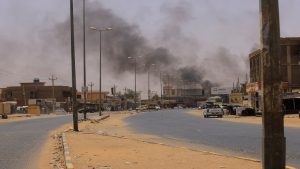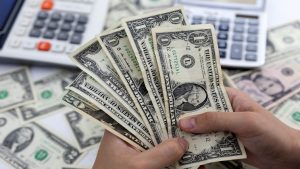A group of senior military officers in the Central African nation announced on TV in the early hours of Wednesday that they had taken control, minutes after the state election body announced that President Ali Bongo had won a third term.
The country’s bond due for repayment in 2025 fell the most, by as much as 14 cents, before recovering to end the day down almost 8.5 cents on the dollar at 85 cents.
That was still the biggest fall since the initial COVID-19 market rout of March 2020. Its two 2031 maturities, both finished down around 7 cents at 74 cents, or a quarter below their original face value.
“The immediate risk to bondholders is that sanctions are imposed that complicate things”, potentially making payments to and from the country difficult, said Charlie Robertson, head of macro strategy at FIM Partners.
The coup, which if successful would be the eighth in West and Central Africa since 2020, could exacerbate already poor access to finance for countries on the continent.
Though Gabon issued one bond as part of its debt-for-nature swap this month, rising global interest rates and concerns about debt levels have meant most African countries have been largely locked out of international debt markets for well over a year.
“The military takeover will force investors to reassess their interest in Gabon and the wider political landscape in the region,” said Maja Bovcon, senior Africa analyst at risk intelligence company Verisk Maplecroft.
Tellimer, a research firm, also warned that multilateral and bilateral lenders could change, or suspend, concessional lending in response to the coup. Meanwhile, shares in Gabon-exposed oil producers TotalEnergies Gabon EGAB.PA and Maurel et Prom fell over 20% at one point.
ANALYSIS | The coup in Gabon should be a wake up call for the continent: Joseph Ochieno
DEBT FOR NATURE
Gabon completed its $436 million “debt for nature” swap earlier this month, where it bought back parts of its 2025 and 2031 bonds and issued a new “blue bond” – so called because some of the proceeds go towards ocean conservation – that runs until 2038.
The blue bond, which has special political risk insurance from the US Development Finance Corporation (DFC) and therefore carries a higher credit rating that Gabon’s other debt, fell 1.5 cents on the dollar to 98.34 cents.
The insurance could cover a full repayment in the event of a future default, subject to an arbitration, but the precise terms of the insurance were not made public at the time of the deal.
“What this does is highlight the risks of debt-for-nature swaps in countries with weak economic or political fundamentals or a history of instability,” said Sebastian Espinosa at White Oak Advisory who has worked on debt-for-nature swaps in other countries.
“A future government may decide it can stand behind the deal, but in the circumstances this is not a given,” he added, highlighting the swap was only finalised a couple of weeks before the country’s election.
Gabon’s next bond interest or ‘coupon’ payment is due in November so the immediate risk for creditors is low, Andrew Stanners, investment director at asset manager abrdn, told Reuters.
Any impact on the rest of the continent meanwhile would depend on “whether we get into a sanctioned or willingness to pay situation,” he said, referring to the possibility that, like in Russia, Western sanctions could effectively prevent investors receiving bond payments.
Though Gabon is the first of recent coup countries that has multiple international bonds, other investors doubted there would be an immediate impact on other bond issuers in the Sub-Saharan African region considering the existing strains.
“This shouldn’t impact the prospect of other countries returning to the market as there wasn’t really any prospect anyway,” said Nick Eisinger, an emerging markets fixed income fund manager at Vanguard.






